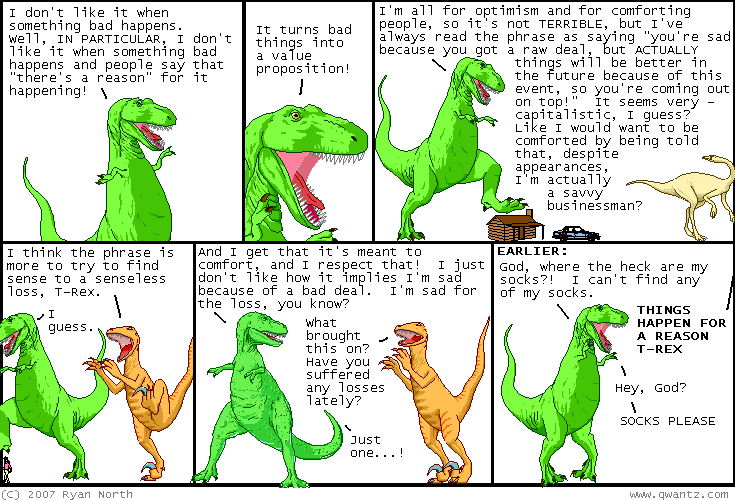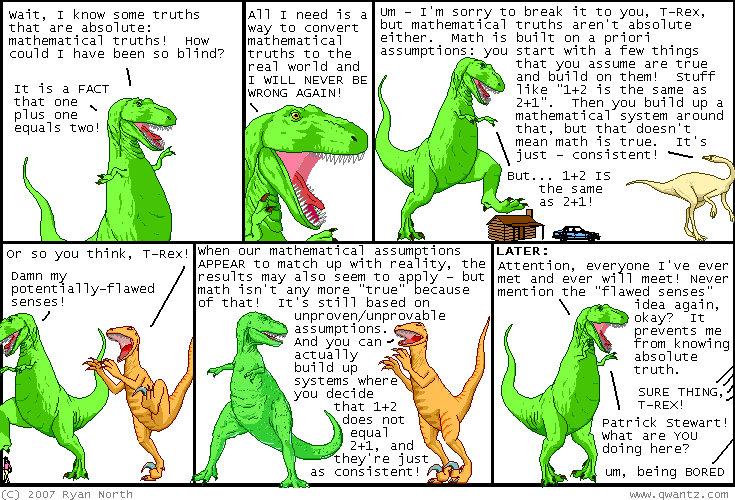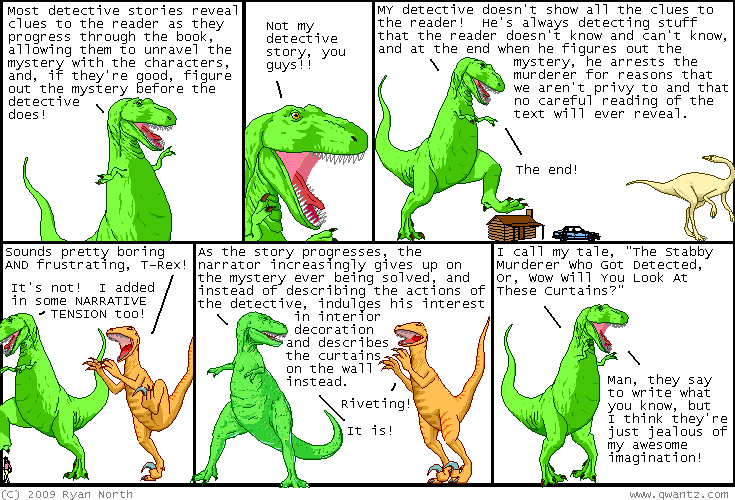You can also take it on Tuesday, December 20th at 7:00 p.m. in our normal classroom. It should take about 60-90 minutes to finish it, but you'll have two hours to take it.

PHIL 09121-02
Rowan University
Fall 2011

1. Go to http://cp.rowan.edu/cp/.
2. Click "Student Self-Service" icon.
3. Click "Access Banner Services - Secure Area - login required"
4. Enter User ID and PIN.
5. Click "Personal Information".
6. Click "Answer a Survey".
7. Click on one of the student evaluations for your classes.
8. Complete the student evaluation.
9. Click “Survey Complete” to submit your completed student evaluation.
10. Repeat for other fall 2011 classes.




Do you think dualism is a good theory of mind? Why or why not? In an approximately 500-word essay, explain and evaluate dualism. Be sure to discuss and evaluate criticisms for this theory. Furthermore, explain and defend your opinion of dualism. Don’t just explain what you believe; explain why you believe it, as well.This assignment is worth 50 points (5% of your overall grade), and is due at the beginning of class on Tuesday, November 29th.

1. Go to http://cp.rowan.edu/cp/.
2. Click "Student Self-Service" icon.
3. Click "Access Banner Services - Secure Area - login required"
4. Enter User ID and PIN.
5. Click "Personal Information".
6. Click "Answer a Survey".
7. Click on one of the student evaluations for your classes.
8. Complete the student evaluation.
9. Click “Survey Complete” to submit your completed student evaluation.
10. Repeat for other fall 2011 classes.





 This is a great introductory article on the problem of suffering.
This is a great introductory article on the problem of suffering.


What do you think best explains the seeming complexity, order, and functionality of natural objects and aspects of the universe? In other words, explain and evaluate the abductive version of the design argument for God's existence.The response is based on the design argument section of the textbook (chapters 5, 6, and 7) and on our discussion in class on October 11th. Like the other reading responses, you won't be graded on your opinion. You'll be graded on how well you DEFEND your opinion. Reading response #2 is word 50 points (5% of your overall grade).
- First, briefly explain the abductive version of the design argument. Describe the relevant evidence that needs to be explained. List the possible hypotheses that attempt to explain that evidence. And explain why proponents of the design argument believe that the intelligent designer hypothesis is the most plausible one.
- Then, evaluate this argument. Is an intelligent designer the best explanation of this evidence? Or is there another, better explanation? Tell me your opinion. Do you think the abductive version of the design argument is a good argument or a bad argument? Why? Be sure to defend your opinion with reasons.


 If you've read a good article on god stuff, recommend it to us by emailing me or posting the link in the comments section of this post. In the meantime, I have some stuff for you.
If you've read a good article on god stuff, recommend it to us by emailing me or posting the link in the comments section of this post. In the meantime, I have some stuff for you.






 Optical illusion time! Here is a pair of collections of Julian Beever's sidewalk art that looks three-dimensional when viewed from a certain angle. That's a picture of one of his creations above.
Optical illusion time! Here is a pair of collections of Julian Beever's sidewalk art that looks three-dimensional when viewed from a certain angle. That's a picture of one of his creations above.

 Here are some links related to our discussion of knowledge and skepticism from class.
Here are some links related to our discussion of knowledge and skepticism from class.


Please paraphrase Descartes's ideas in your own words. The response is based on the Descartes reading from pages 207-216 of the textbook.
- What kinds of beliefs does Descartes say he cannot be certain of? Why does he believe he can't be certain of these? Hint: Descartes mentions 2 general categories of beliefs in Meditation I (pages 207-210). See also pages 159-160.
- What beliefs does Descartes say he can be certain of? Why does he believe he can be certain of these? Hint: Descartes mentions 2 specific beliefs in Meditation II (pages 210-216). See also pages 160-162.
- Evaluate his reasons: do you agree with Descartes? Why or why not?


P1- true
P2- true
support- good
overall- good
P1- questionable ("annoying" is subjective)3) All males in this class are humans.
P2- true
structure- good (the premises establish that some email forwards are both annoying and false; so some annoying things [those forwards] are false)
overall - bad (bad first premise)
P1- true4) No humans are amphibians.
P2- true
support- bad (the premises only tell us that males and females both belong to the humans group; we don't know enough about the relationship between males and females from this)
overall- bad (bad support)
P1- true5) All bats are mammals.
P2- true
structure- good (the premises say that frogs belong to a group that humans can't belong to, so it follows that no frogs are humans)
overall- good
P1- true6) Some dads have beards.
P2- true (if interpreted to mean "All bats are the sorts of creatures who have wings.") or false (if interpreted to mean "Each and every living bat has wings," since some bats are born without wings)
support- bad (we don't know anything about the relationship between mammals and winged creatures just from the fact that bats belong to each group)
overall- bad (bad support)
P1- true7) Oprah Winfrey is a person.
P2- questionable ("mean" is subjective)
support- good (if all the people with beards were mean, then the dads with beards would be mean, so some dads would be mean)
overall- bad (bad 2nd premise)
P1- true8) All students in here are mammals.
P2- true (you might not have directly seen anyone eat tacos, but you have a lot of indirect evidence... with all the Taco Bells, Don Pablos, etc., surely lots of people ate tacos yesterday)
support- bad (the 2nd premise only says some ate tacos; Oprah could be one of the people who didn't)
overall- bad (bad support)
P1- true
P2- true
structure- bad (the premises only tell us that students and humans both belong to the mammals group; we don't know enough about the relationship between students and humans from this; for instance, what if a dog were a student in our class?)
overall- bad (bad structure)
 9) All hornets are wasps.
9) All hornets are wasps.P1- true!10) If Sean sings, then students cringe.
P2- true
P3- questionable ("scary" is subjective)
structure- good (same structure as in argument #1, just with an extra premise)
overall- bad (bad 3rd premise)
P1- questionable (since you haven't heard me sing, you don't know whether it's true or false)11) If Sean sings, then students cringe.
P2- false
structure- good
overall- bad (bad premises)
P1- questionable (again, you don't know)12) All students in here are humans.
P2- true
structure- bad (from premise 1, we only know what happens when Sean is singing, not when he isn't singing; students could cringe for a different reason)
overall- bad (bad 1st premise and structure)
P1- true13) (from Stephen Colbert)
P2- true!
support- so-so (the premises state a strong statistical generalization over a large population, and the conclusion claims that this generalization holds for a much smaller portion of that population; while it could be true that the humans in here are a statistical anomaly, given the strength of the generalization, it's likely that most students in here are, in fact, shorter than 7 feet tall)
overall- so-so (not perfect, since the support isn't perfect, but pretty good)
P1- questionable ("great" is subjective)14) If Sean sings, then students cringe.
P2- questionable ("great" is subjective)
support- good (it's either A or B; it's not A; so it's B)
overall- bad (bad premises)
P1- questionable (again, you don't know)15) If Sean sings, then students cringe.
P2- false
structure- bad (from premise 1, we only know that Sean singing is one way to guarantee that students cringe; just because they're cringing doesn't mean Sean's the one who caused it; again, students could cringe for a different reason)
overall- bad (bad premises and structure)
P1- questionable (again, you don't know)16) If there is no God, then life is meaningless.
P2- true
structure- good
overall- bad (bad 1st premise)
P1- questionable (that's not an obvious claim to prove or disprove)
P2- questionable (again, that's not an obvious claim to prove or disprove)
support- good (the same structure as argument #13)
overall- bad (bad premises)

 Delia Graff Fara:
Delia Graff Fara: "By doing philosophy we can discover eternal and mind independent truths about the ’real’ nature of the world by investigating our own conceptions of it, and by subjecting our most commonly or firmly held beliefs to what would otherwise be perversely strict scrutiny."
"Philosophy is the strangest of subjects: it aims at rigour and yet is unable to establish any results; it attempts to deal with the most profound questions and yet constantly finds itself preoccupied with the trivialities of language; and it claims to be of great relevance to rational enquiry and the conduct of our life and yet is almost completely ignored. But perhaps what is strangest of all is the passion and intensity with which it is pursued by those who have fallen in its grip."
 Sally Haslanger (only available in the book):
Sally Haslanger (only available in the book):"Given the amount of suffering and injustice in the world, I flip-flop between thinking that doing philosophy is a complete luxury and that it is an absolute necessity. The idea that it is something in between strikes me as a dodge. So I do it in the hope that it is a contribution, and with the fear that I’m just being self-indulgent. I suppose these are the moral risks life is made of."

